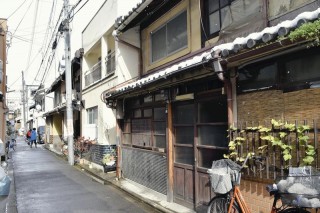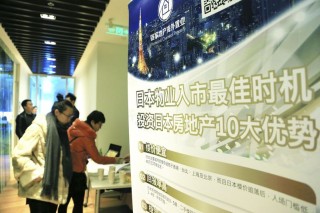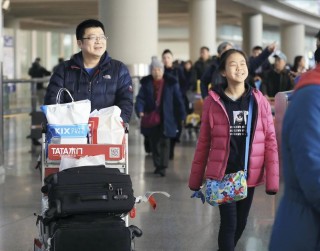Loading
Search
▼ Chinese Investors Seek Old Houses in Kyoto
- Category:Other
BEIJING — Japan placed second after Thailand in a list of overseas vacation destinations for people from China during the Lunar New Year holiday period this year from Jan. 27 to Feb. 2, according to the China Tourism Academy. The number of Chinese tourists to Japan topped 6 million for the first time last year, showing that Japan as a destination continued to enjoy strong popularity among people from China. It seems that “massive buying” of real estate in Kyoto and elsewhere in Japan by people from China has recently been gaining intensity.
‘Atmosphere totally changed’
A Chinese buyer purchased an 80-year-old private house that had been left vacant for many years in a residential area near Nijo Castle in Kyoto last year.
The house is typical of the Kyo-machiya traditional structure that is long and narrow. It has a floor space of about 100 square meters and was sold for several tens of millions of yen. The house will be remodeled into an upscale accommodation facility.
Joey Dai, 35, chief executive officer of Yoiju Inc., a Beijing-based real estate company that brokered the deal, stressed that the transaction signified the preservation of traditional machiya Japanese houses.
“The deal represents a business model of interactions between Chinese people who want to buy real estate in Japan and Japanese people who want to halt the decline in the number of machiya houses,” Dai said.
The number of machiya has been decreasing due to lifestyle changes and population decline. According to a survey conducted by the Kyoto municipal government, more than 10 percent of about 47,000 existing machiya houses are unoccupied and about 2 percent are dismantled every year.
There are also cases in which foreigners have established funds for machiya preservation to purchase the buildings. In this situation, expectations of Chinese investment have been growing.
Yoiju reportedly began its brokerage business for houses in Kyoto last summer and has since sold about 10 such houses to Chinese buyers. Given Kyoto’s global popularity as a tourist spot, houses there are popular because high profits can be expected if they are remodeled into accommodation facilities.
On the other hand, there is a lot of concern over the possibility of houses being used for unlicensed operators of minpaku businesses in which private houses are used to accommodate tourists, or repeatedly resold. An 85-year-old man living near a machiya bought by a Chinese person raised his eyebrows as he said: “Vacant houses in this neighborhood have become inns for foreign people one after another. This has been a town of residents for a long time, but the atmosphere has completely changed.”
Chinese people started purchasing real estate in Hokkaido and elsewhere in Japan about a decade ago. An official of a major Chinese real estate firm that established a department in charge of business in Japan explained the recent trend, saying, “People who have a good impression of Japan after visiting the country tend to target Japanese real estate for investments.”
The trend in which wealthy Chinese people, tired of the domestic real estate bubble, buy Japan’s real estate will likely not end any time soon. The official anticipates that “relatively low-priced real estate in regional Japanese cities will also become targets for Chinese investments.”
Drop in shopping sprees
Beijing Capital International Airport was crowded with Chinese people returning from overseas trips on Feb. 2, the final day of the Lunar New Year holiday period.
Almost none of the Chinese tourists returning from Japan were seen holding rice cookers or toilet seats with bidets, which used to be typical of shopping sprees by Chinese people.
A female company employee, 30, who returned from a personal trip to Osaka, said: “This was my fourth visit to Japan. I bought clothes and shoes just for my own use this time.”
A woman in her 40s, who had visited Japan for the first time, said: “I purchased mainly cosmetics and medicine. As for rice cookers, we can buy them here in China.”
There are also cases in which foreigners have established funds for machiya preservation to purchase the buildings. In this situation, expectations of Chinese investment have been growing.
Yoiju reportedly began its brokerage business for houses in Kyoto last summer and has since sold about 10 such houses to Chinese buyers. Given Kyoto’s global popularity as a tourist spot, houses there are popular because high profits can be expected if they are remodeled into accommodation facilities.
On the other hand, there is a lot of concern over the possibility of houses being used for unlicensed operators of minpaku businesses in which private houses are used to accommodate tourists, or repeatedly resold. An 85-year-old man living near a machiya bought by a Chinese person raised his eyebrows as he said: “Vacant houses in this neighborhood have become inns for foreign people one after another. This has been a town of residents for a long time, but the atmosphere has completely changed.”
Chinese people started purchasing real estate in Hokkaido and elsewhere in Japan about a decade ago. An official of a major Chinese real estate firm that established a department in charge of business in Japan explained the recent trend, saying, “People who have a good impression of Japan after visiting the country tend to target Japanese real estate for investments.”
The trend in which wealthy Chinese people, tired of the domestic real estate bubble, buy Japan’s real estate will likely not end any time soon. The official anticipates that “relatively low-priced real estate in regional Japanese cities will also become targets for Chinese investments.”
Drop in shopping sprees
Beijing Capital International Airport was crowded with Chinese people returning from overseas trips on Feb. 2, the final day of the Lunar New Year holiday period.
Almost none of the Chinese tourists returning from Japan were seen holding rice cookers or toilet seats with bidets, which used to be typical of shopping sprees by Chinese people.
A female company employee, 30, who returned from a personal trip to Osaka, said: “This was my fourth visit to Japan. I bought clothes and shoes just for my own use this time.”
A woman in her 40s, who had visited Japan for the first time, said: “I purchased mainly cosmetics and medicine. As for rice cookers, we can buy them here in China.”
According to the preliminary survey results released by the Japan Tourism Agency on the consumption trend of foreigners visiting Japan in the October-December quarter of 2016, the average value of spending by Chinese tourists stood at about ¥121,000, a drop of ¥40,000 from the previous year.
The percentage of Chinese travelers who bought electric appliances declined sharply from 40.7 percent for 2015 to 27.8 percent.
The range of Chinese people visiting Japan has been broadening. Expectations are mounting that this year, which marks the 45th anniversary of the normalization of Japan-China relations in 1972, private-level exchange programs will be invigorated, thereby giving momentum to the improvement of bilateral relations.
But a recent uproar may hinder such a development. The Chinese government called for boycotting APA Group hotels, which were used by many Chinese tourists in Japan, after it was reported that a book denying the Nanjing Incident was found in hotel guest rooms.
Some view this as an “organized move to halt the Chinese craze for Japan that went overboard.”
This autumn, the Communist Party of China will hold its congress, which takes place every five years, to decide on the lineup of state leaders.
Ahead of the previous congress, large-scale anti-Japan demonstrations occurred in various parts of China to protest Japan’s nationalization of the Senkaku Islands in Okinawa Prefecture. Problems in relations with Japan tend to be used for political purposes in China.
Even if the number of Chinese visitors to Japan increases, it won’t directly lead to the improvement of bilateral relations.
The percentage of Chinese travelers who bought electric appliances declined sharply from 40.7 percent for 2015 to 27.8 percent.
The range of Chinese people visiting Japan has been broadening. Expectations are mounting that this year, which marks the 45th anniversary of the normalization of Japan-China relations in 1972, private-level exchange programs will be invigorated, thereby giving momentum to the improvement of bilateral relations.
But a recent uproar may hinder such a development. The Chinese government called for boycotting APA Group hotels, which were used by many Chinese tourists in Japan, after it was reported that a book denying the Nanjing Incident was found in hotel guest rooms.
Some view this as an “organized move to halt the Chinese craze for Japan that went overboard.”
This autumn, the Communist Party of China will hold its congress, which takes place every five years, to decide on the lineup of state leaders.
Ahead of the previous congress, large-scale anti-Japan demonstrations occurred in various parts of China to protest Japan’s nationalization of the Senkaku Islands in Okinawa Prefecture. Problems in relations with Japan tend to be used for political purposes in China.
Even if the number of Chinese visitors to Japan increases, it won’t directly lead to the improvement of bilateral relations.
- March 1, 2017
- Comment (0)
- Trackback(0)




